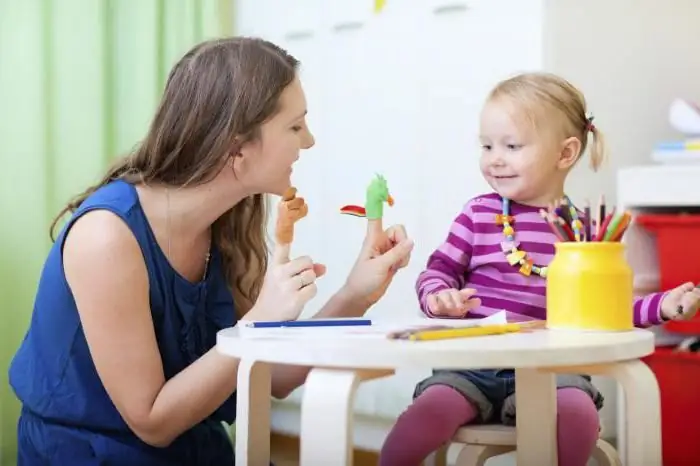2026 Author: Priscilla Miln | miln@babymagazinclub.com. Last modified: 2025-01-22 17:55:26
Classes on the development of speech in the middle group are held in order to form the correct speech skills in the child in accordance with the age category. The success of the child's adaptation among peers, as well as further education in elementary school, depends on the correct pronunciation and the ability to express one's own thoughts. It is the level of development of language skills that shows what the level of mental and intellectual development of a particular child is.
Why do we need speech development classes for children?

A lesson on the development of speech with middle preschoolers is carried out only in a playful way. This is due to the psychological characteristics of children of this age, since they think objectively. They have not yet developed perseverance and attentiveness. Middle preschool children are too emotional, so they get tired easily. Play activities should be age appropriate. The success of learning depends on how much the child penetrates the game process, how muchthis event will be his own. During the game, the baby uses all the basic mental processes. He hears, acts, sees, interacts with the outside world through a variety of game techniques. In the classroom, the child listens to the explanations of the teacher, answers the questions posed, learns to listen to the answers of other children. During the game, the kids do not notice that they are also learning.
Problems of speech development of middle-aged preschoolers
1. Situational speech is the inability to build complex and complex sentences. In such children, speech turns are formed, as a rule, from sentences that consist of two or three words.
2. Small vocabulary.
3. Speech containing slang and non-literary expressions.
4. Poor diction.
5. Logopedic speech disorders.
6. Inability to build a dialogical speech, ask the right question, give a short or detailed answer, based on the situation.
7. Inability to build a monologue speech: retell the plot of the story close to the text or in your own words, compose a story-description on a specific topic.
8. Failure to use rationale in one's own conclusions.
9. The culture of speech has not been formed: the child cannot select intonation, speech rate, voice volume and other parameters in a specific speech situation.
How to develop coherent speech in preschoolers?

What do classes for the development of coherent speech include? Connected speech means the possibilityaccurately, figuratively, logically and consistently present any information. Speech must be grammatically correct. Connected speech includes:
- Dialogue. Assumes knowledge of the language, provides live communication between children. The dialogue can be built in the form of separate remarks, conversations between participants, statements of the "question-answer" type. Classes for the development of speech in the middle group involve the formation of dialogue speech skills: the child learns to briefly and concisely answer the questions posed, to enter into a discussion with the teacher and peers. In the classroom, the formation of communication culture skills continues: children are taught to listen to the interlocutor, not to interrupt the speaker, not to be distracted, to include synonymous forms of etiquette in speech.
- Monologue. It is a coherent speech of one person, the skill is formed by the age of five. The complexity of such speech lies in the fact that a child in the middle preschool age is not yet able to program his own statement, to express a thought logically, consistently and continuously. Classes for the development of speech in the middle group involve teaching three types of monologue speech: reasoning, narration and description. At the same time, kids learn to describe the subject and retell small texts.
Speech with movements in the middle group

Speech with movements (middle group) allows you to coordinate the movements of the arms and legs with spoken phrases. Many children of middle preschool age have inaccurate and inconsistent movements. Lessons for the development of fine motor skills of hands allowraise the level of speech development, gradually learn to coordinate movements with speech.
Japanese doctor Namikoshi Tokujiro has created a special healing technique for influencing the hands. According to his teachings, there are a large number of receptors on the fingers that send impulses to the central nervous system. There are acupuncture points on the hands. By massaging them, you can influence the state of internal organs. It was this teaching that formed the basis for the development of speech using movements. Experts have found that the correctness and level of development of speech depends on the accuracy of the movements of the small muscles of the hands. M. Montessori in his book “Help me do it myself” emphasizes: “If the development of finger movements corresponds to the age norm, then the development of speech is also within the normal range. If the development of motor skills of the fingers lags behind, then speech also lags behind. Such language development activities in the middle group include:
- finger games (using tongue twisters, poems, physical minutes, finger gymnastics);
- work with cereals (sorting through cereals of different sizes, drawings on the cereal);

- applications (mosaic, clipping, from sticks);
- beading;
- lacing;
- paper work;
- flowers made of woolen threads;
- eggshell paintings;
- hatching;
- drawing around the outline;
- graphic dictations;
- tasks like "finish the drawing";
- modeling using natural material;
-graphic exercises;
- stencil drawing;
- work with water (transfusion of water with pipettes);
- construction of a well from matches;
- work with hole punch;
- didactic games and exercises using natural, household material.
Speech Correction Classes

How is speech development carried out (middle group)? Classes are aimed at expanding vocabulary, diction, developing the ability to correctly use intonation and detailed answers, build evidence, and compose a dialogue. For the development and correction of speech in the middle group, a set of exercises is used:
- Talking about a picture - it means a story about the plot of the illustration. Such a task allows you to select words that are close in meaning (synonyms), memorize the meaning of words. Special printed publications are suitable for classes, in which there are tests and a variety of exercises aimed at developing these skills.
- Tongue twisters, tongue twisters, proverbs and sayings not only expand the vocabulary of middle preschool children, but also help to coordinate the speech apparatus. Such exercises allow you to correct speech defects when a child swallows the endings of words during a conversation or, conversely, draws out words during a conversation.
- Games like "What does it mean?" or “Why do they say that?” allow you to select words that are close in meaning when explaining a particular concept. For this, it is recommended to use phraseological units, proverbs andsayings.
- The game "Journalist" allows children to develop conversational speech skills. The child learns to compose questions for the “interview”, to consistently and clearly express his thoughts.
How to analyze a speech development session?

Analysis of a speech development lesson is necessary not only for reporting, but also in order to understand which teaching methods are the most successful and suitable for increasing the level of speech development in this particular group. In the process of analysis, the teacher can control how long it took to master the new material, which of the children did not master the material or did it at a low level. In the process of analysis, it is necessary to pay attention to the following points:
- how much did you manage to motivate each participant to learn;
- how correctly each one followed the instructions of the teacher;
- what moments did not go well;
- what methods and techniques were involved, which of them turned out to be inappropriate;
- whether the material was presented in an accessible way;
- what is the general emotional climate of the class;
- what points you need to pay attention to in the next lesson;
- what skills and abilities need correction;
- which of the children should be given special attention.
In what cases does the speech development of children of the middle group (4-5 years old) not correspond to the norm? When do I need to consult a speech therapist and a neurologist?

Consultation speech therapist anda neurologist is urgently needed if:
- the child has a small vocabulary or is completely absent by 4 years;
- speech is incomprehensible, based on a large number of gestures;
- the child stutters, stutters or has other obvious speech disorders;
- had a history of trauma to the head, nasopharynx, or oral cavity that resulted in impaired speech or silence.
Timely access to specialists will help correct speech disorders, otherwise the child will not be able to speak correctly, he will be doomed to study at a specialized school for children with speech defects. Such violations do not go away on their own.
Recommended:
Speech therapy classes for children (2-3 years old) at home. Speech therapist classes with children 2-3 years old

When a child at 2-3 years old does not speak, parents panic. It seems to them that if the neighboring children speak very well, then their baby is lagging behind in development. However, it is not. Speech therapists say that each child is individual. Non-speaking children can be taught at home. In this article, you can find exercises, tips and tricks that will help keep your child interested
Development of speech in the preparatory group. Abstract of a lesson on the development of speech in the preparatory group

This article talks about the organization of the speech environment for future first-graders within the walls of the kindergarten. Various methods for developing speaking and communication skills are described here. The information presented in the article will be a good hint not only for preschool teachers, but also for parents
Integrated lesson in the middle group: plan

Children 4-5 years old are usually called preschoolers. At this age, parents lead them to the middle group of the preschool educational institution. The task of teachers during this period is to develop the abilities of children to the maximum, to enrich the baggage of knowledge accumulated by them before and to prepare them for school life. To do this, kindergartens conduct classes called integrated. We learn from this article what they are and what role they play in the intellectual development of babies
Open integrated lesson in the preparatory group for mathematics and speech development

Open classes are an important part of the upbringing and educational process not only for children, but also for adults. This is a way to show parents the methods and skills of a caregiver, as well as share experiences with their colleagues from other institutions. Today we will talk about how to properly conduct an open integrated lesson in the preparatory group
Average group of kindergarten. Classes in the middle group

The article describes the features of teaching and educating children of the middle group of kindergarten. It is noted how they differ from pupils of other groups. It is told how to properly organize the environment so that it contributes to the development of children. The program tasks are presented, which must be adhered to when planning the activities of children in kindergarten. The article will be useful to teachers of preschool institutions

